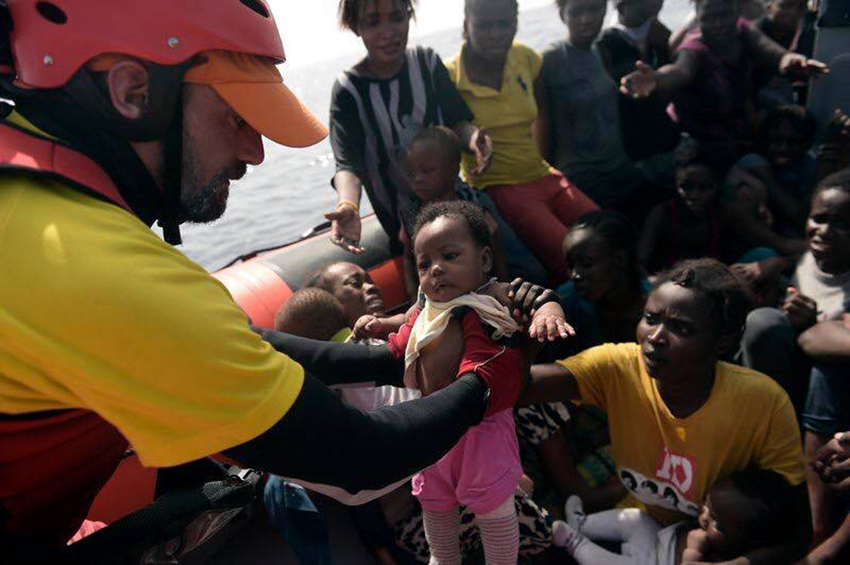In 2015, photos of three-year-old Syrian Alan Kurdi, face down and drowned on a Turkish beach, became a symbol of the refugee crisis.
After seeing the photo, activist and former soccer player Oscar Camps embarked on a journey that would lead him almost 2,000 miles away to save over 55,000 lives.
As the director of a company of lifeguards, Camps left Barcelona for Lesbos, Greece to see the refugee crisis up close. There, they realized the situation was more dire than they imagined, and after 15 days of rescues, they returned to Barcelona to begin raising money to fund a rescue organization. In 2015, Proactiva Open Arms was born and since then, they’ve operated in Lesbos and later the Mediterranean Sea, depending solely on volunteers to rescue refugees.
Mar Sabe, a volunteer on the Lesbos mission who now works as Proactiva’s communication officer, was living in Cuba when she heard about the refugee crisis in Greece. She packed her bags and went to work for Proactiva shortly after.
“Thousands of people were trying to cross the 9 kilometers between Turkey and Greece daily,” Sabe said. “We had a permanent team there and had up to 20 lifeguards organizing themselves to do rescues 24/7.”
Eventually, the EU and Turkey signed an agreement that would reduce the traffic of refugees.
“From one day to another there were thousands of people, and then it just stopped,” Sabe said.
This prompted the organization to launch another mission in the Mediterranean Sea in the summer of 2016. Within four months, they had rescued 16,000 people, the majority of whom were fleeing
from Libya.
Lifeguard Austin Wainwright volunteered with the organization for eight consecutive missions from May to August of this year. Born and raised in the Canary Islands, Wainwright has been working in the sea his entire life. He feels as though the work is a calling, but said it takes an emotional toll.
“It’s not easy to walk away from once you’ve seen it,” Wainwright said. “You just know that if you hadn’t found them, they’d almost certainly be dead.”
Before each mission, Wainwright said each of Proactiva’s ships are carefully checked and stocked with proper humanitarian aid from food and water to blankets and medical supplies. Once they’re about 30 miles offshore, hours of training and rescue drills put them in high alert.
“There’s no search and rescue manual in the world that tells you how to rescue anywhere between 100 up to 1000 people on a boat that’s sinking, where the vast majority of people can’t swim,” Wainwright said.
Over the past few months, Wainwright has noted a shift in Libya. Across the Mediterranean, Italy is a popular destination for refugee arrivals. But in recent months, the number of arrivals has decreased by more than 80 percent. Human rights activist like those at Proactiva believe Italy is negotiating with Libyan warlords to stave off the flow of migrants.
Wainwright says this further jeopardizes the lives of refugees and puts their rescuers in danger as well. Recently, warning shots were fired at one of Proactiva’s vessels, and they were intercepted by members of the Libyan coast guard. This has caused them to pull back their rescue operations further away from the coast, which places refugees at risk.
“People are unaware of what’s happening in Libya,” Wainwright said. “It just shows how vile the human race can be if they want to be. Not just in Libya but other countries to Libyans. It’s horrific.”
Despite the increasing danger, Proactiva’s lifeguards are dedicated to pressing on.
“If there is one single life that may be adrift, we’ll be there,” Sabe said. “No one should have to die in
the sea.”
Editor’s note: The Daily Texan’s Helen M. Powell scholarship gives one current or ex-staff member the opportunity to travel and report outside of Austin. This year’s recipient, Cat Cardenas, traveled to Spain to write about the country’s present-day issues.















